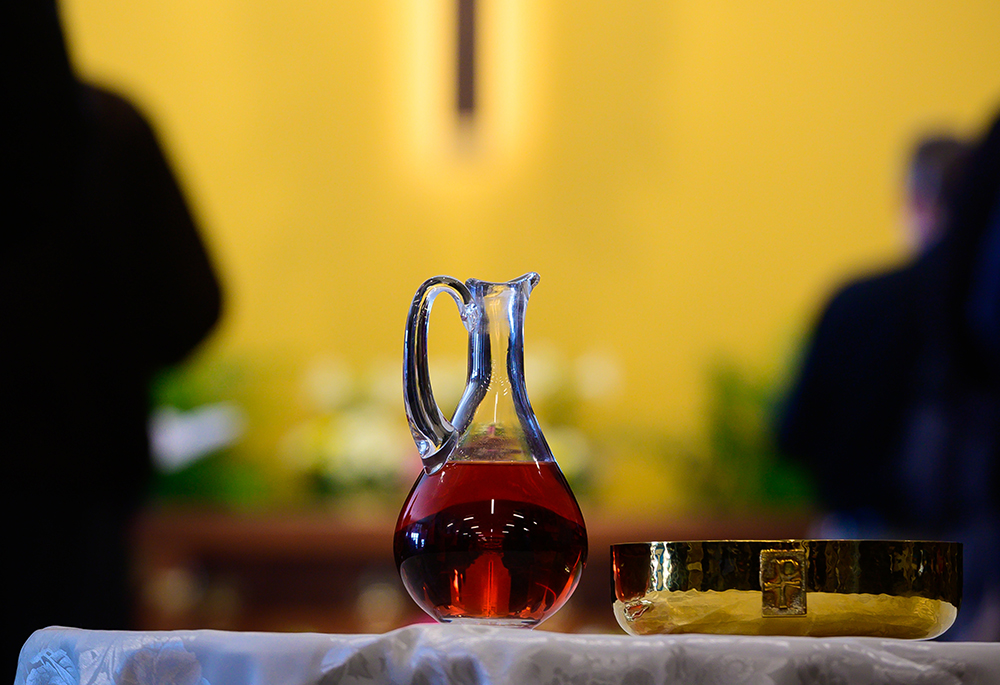
A glass cruet and ciborium, holding wine and bread that will become the body and blood of Christ, sit on a table during Mass inside the Mother of Mercy Hall at the National Shrine of Our Lady of Good Help April 28, 2019, in Champion, Wisconsin. (CNS/The Compass/Sam Lucero)
Who knows what will result from the promises we make? Does the couple who says, "I do," have any clue of the joy that awaits them, or what will test and deepen their love? These questions help us understand what this solemnity is all about: a commitment that promises not only faithfulness, but also unpredictable adventures, joys and difficulties.
Ya gotta love today's story from Exodus. As if at a sports event, the people shout, "We will do everything that the Lord has told us!" What a promise! Everything! But that's precisely the commitment God's people made that day, they were saying, "I do," to their side of an everlasting, unpredictable covenant.
Surely, the church chose this reading, not for that wild, impossible promise, but because it described the sealing of a covenant between God and humanity. Through creation and the Exodus, the people already knew God as their maker and redeemer. Now, God takes them one step further, revealing self to them through inspired word and commands.
The dramatic sacrifice formalizing this was truly impressive. Moses built an altar in a place that represented all the people. Then he sent some strong guys to slaughter bulls and bring back their blood so that he could divide it between the altar and people. The blood symbolically sealed their covenant. It made God and the people blood relatives, now and forever. This sets the scene for Mark's account of Jesus' last supper.
Seated at the tables of that supper, the disciples echoed the ancient Israelites' "I do." As in the Mosaic covenant, the initiative came from God through Jesus. Jesus had planned it all, from finding the dinner room to presiding at the table.
At that table, Jesus made a dramatic claim that Christians would repeat and ritualize for ages to come. After giving thanks, Jesus offered them the bread of communion, asking his companions to ingest and embrace in it everything he was for them. The disciples' communion with him at that supper drew them into a covenant. They became family.
Mark has a particular twist in his Last Supper account. He emphasizes the idea that this communion-covenant implicates all of the participants beyond their imaginings. The twist comes in telling us that the disciples drank from the cup before Jesus told them what it entailed.
Like them, as we accept God's self-offering by receiving bread and cup, we commit ourselves to unpredictable ways of carrying out Jesus' self-giving: we too offer our body and blood, everything we have and are, as we work and wait for the fulfillment of the reign of God.
The unnamed author of the Letter to the Hebrews (sometimes ascribed to Paul's coworker Priscilla), wrote this "letter" as a homily to hearten discouraged Christians who had expected God's reign to burst in on them at any moment. She designed the letter to give heart to a people wondering if they had believed in vain. She demonstrated how Christ and his new covenant fulfill the promises God made from the beginning of the world, and especially to the Hebrew people.
Perhaps before trying to understand this, we might let ourselves be caught up in the joy of Psalm 116. In gratitude for the gifts of life and faith and all that go with them we sing, "How can I make a return to the Lord for all the good done for me?"
Advertisement
The response could hardly be clearer: "I will take up the cup of salvation." This is the cup of the covenant ("my vows") in Christ. This cup symbolizes a road of salvation that no one can predict, yet one in which we know that our faithful God will continue to draw us forth, no matter what. That's plenty of reason to sing!
The Solemnity of the Body and Blood of Christ invites us to become communion in Christ. Our sisters and brothers in the Eastern churches call this theosis or divinization. St. Irenaeus (circa 130-202) was the first great champion of theosis which he explained by saying that God became human so that humans might become God. St. Augustine proclaimed the same idea about the Eucharist with the words, "Be what you see, and receive what you are." The Eucharist makes us one with God.
Our communion in the body and blood involves everything we have and are. With each communion, we repeat our own "I do," to the invitation to strengthen our blood bond with one another and with God, to the invitation to share in the very life of God. As we strive to keep our side of this covenant, we can remain confident because God not only remains faithful, but continually draws us forward toward the day when we all "drink it new in the reign of God."
